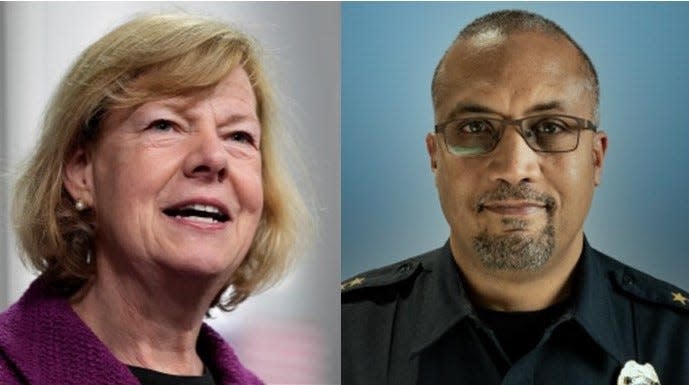Fentanyl deaths scar Wisconsin. We'll represent families at State of the Union. | Opinion
In the early hours of a November morning in 2021, Michelle got a call that her son Cade – a freshman in college – had passed away. The night before, Cade had gone out with friends in his dorm and took a pill he thought was Percocet. It turned out to be 100% fentanyl.
“He had his entire life ahead of him,” his mother said. “He was home from college the weekend before he died talking about changing his major to psychology and how he wanted to travel the world. He deserved to learn from his mistake, not die from it. He didn’t overdose from taking one pill. He was poisoned.”
Sadly, this story is not unique in our state. In 2022, more than 1,800 Wisconsinites died of an overdose, including nearly 70 in Waukesha County. According to recent data, synthetic opioids, primarily fentanyl, were identified in 91 percent of opioid overdose deaths in Wisconsin. And too often, like Cade, they might not even know they are taking fentanyl – a drug that can kill the average person with just the amount that would fit on the tip of a pencil. With fentanyl, one pill can kill.
Opioid deaths ravage Wisconsin, no matter geography or politics
Year after year, our state is devastated by opioid-related deaths. This epidemic is impacting communities big and small, in rural and urban parts of our state. It’s an epidemic that doesn’t know county lines, let alone political divides. This touches all of us. We both have family and friends who have fought, and too often lost, battles with addiction. Too many Wisconsin families have an empty seat at the dinner table because of this epidemic.
Fake pills fueling fentanyl deaths. Why isn't more being done to stop this?
This problem of course is not unique to Wisconsin. The fentanyl crisis is a complex and intertwined challenge – from lack of oversight of chemical suppliers in China and border security issues, to underinvestment in prevention, recovery, and treatment resources. To tackle it, it will take action on all fronts.
This year, as President Biden delivers his annual State of the Union to the country, we’ll be representing all of those who lost their lives to this epidemic, representing their loved ones, and representing those helping fight this crisis. The opioid epidemic is not a political issue. It’s a moral one. It’s high time we came together to do something about it.
Together with our partners at every level of government, community leaders and advocates, law enforcement and elected officials, we’re committed to making a difference. We have to crack down on the chemical manufacturers in China who are fueling this crisis, stop the cartels in Mexico who are profiting from this epidemic, and invest in border security and technology. We have to close loopholes that allow illicit drugs into the U.S. without proper inspection.
We also have to give our local law enforcement and communities the resources and tools they need to clamp down on dealers and help those struggling with addiction get the care they need. While we will not be able to prevent every overdose or poisoning from happening, we can prevent more of those overdoses from taking our loved ones’ lives by increasing access to overdose-reversal drugs like naloxone.
Majority of Americans worry about overdoses, want action
We have made some progress in confronting this epidemic. In Congress, we’ve increased funding for prevention and recovery resources to help those battling addiction because we know that addiction is a real disease. Wisconsin has decriminalized fentanyl test strips, and we are working to make opioid reversal drugs like naloxone more widely available in our communities.
Lower quality. Higher prices. School Board hasn't made case for MPS referendum.
But we can’t fight this crisis alone and we can’t lose sight of what is at stake. It’s going to take all of us working together, committed to saving lives and turning the page on this dark chapter for our state. And the American people agree – 9 in 10 Americans are worried about fentanyl overdose deaths. We’re proud to stand together as we continue working with Republicans and Democrats to make real change, and we call on all of you to join us.
No parent, like Michelle, should have to wake up to the news their child has died of an overdose or poisoning. We can and must do more to turn the tide on the opioid epidemic and save lives.

U.S. Sen. Tammy Baldwin, D-Wis., was first elected to the Senate in 2012. Daniel Thompson is the Chief of Police in Waukesha.
This article originally appeared on Milwaukee Journal Sentinel: Staggering opioid overdose deaths demand action from Biden, GOP
